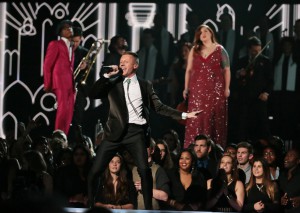There is a lot to be abuzz about regarding Sunday night’s Grammys.
Queen Latifah officiating the marriage of 33 couples during a collaborated performance by Macklemore and Madonna anyone?
However, the record-breaking performance was overshadowed by a headline of a different sort. While Macklemore walked away with four Grammy wins, including Best Rap Album, an online-born “boo” trailed closely behind the actual applause of the night.
Criticism arose when, after the Grammys, Macklemore shared a private apology on Instagram to Best New Artist front-runner, Kendrick Lamar.
“You got robbed,” Macklemore shared, adding that in his opinion, Lamar should have won the category for Best Rap Album.
The twittersphere exploded in outrage as Lamar walked away from the evening empty-handed.
Brittney Cooper of Salon Magazine, an online arts and culture magazine, openly expressed her disapproval the following day, writing, “Everyone knows [Kendrick Lamar’s] the best new artist. Macklemore on his best day can barely hold a candle to Kendrick on his worse [sic] day.”
Cooper went on to lampoon the Grammys and declare Macklemore’s apology “useless.”
“This wholesale belief that white folks doing black s**t equals progress is the first lie the 2014 Grammys told,” Cooper wrote. The second lie, she added, was that “white folks have received these awards because of meritorious performance rather than racial privilege.”
While Cooper’s opinion has been shared across the scope of social media, it undeniably reinforces a concept of white guilt that requires white artists in mediums such as hip-hop to apologize for something out of their hands: the privilege their race may afford them. As defined by race-relations scholar Shelby Steele, white guilt is a sense of guilt felt by whites for past and present racism towards any person of color.
While Macklemore’s album “The Heist” featured singles such as “Same Love” which were clearly works of advocacy for a marginalized homosexual demographic—a trending topic on the current cultural horizon—it was not enough to please critics like Cooper. Cooper declared Macklemore should have used his self-professed “white privilege” to challenge the structure of power “in a moment when the world was watching.” In other words, Cooper was asking Macklemore to defy the decision of the entire National Academy of Recording Arts and Sciences, and by extension, to disrespect all the fans his songs empowered because it was his race and not his talent that had empowered him to win.
Cooper failed to recognize the fact that Macklemore’s message of acceptance is not any less meaningful than Lamar’s message of redemption.
That does not mean that Lamar deserved to walk away the way he did, without a single award; however, it does bring into question why Cooper did not criticize Macklemore for entering the hip-hop genre as a whole.
The whitewashing of hip-hop is indeed a conversation worth having, especially as crossover pop princesses like Miley Cyrus are perceived as “good girls gone bad,” which creates a standard by which the pop genre is perceived as “good” and by extension, hip-hop is perceived as “bad.”
However, this does not serve as justification for the marginalization of white talent in genre dominated by non- whites.
While Macklemore haters like Cooper may criticize him for his success, they forget that they are doing nothing of real substance to further promising artists like Lamar, leaving him to appear a mere victim to Macklemore.
At the end of the day, Lamar is no such thing; he is simply a good kid in a very mad city.

